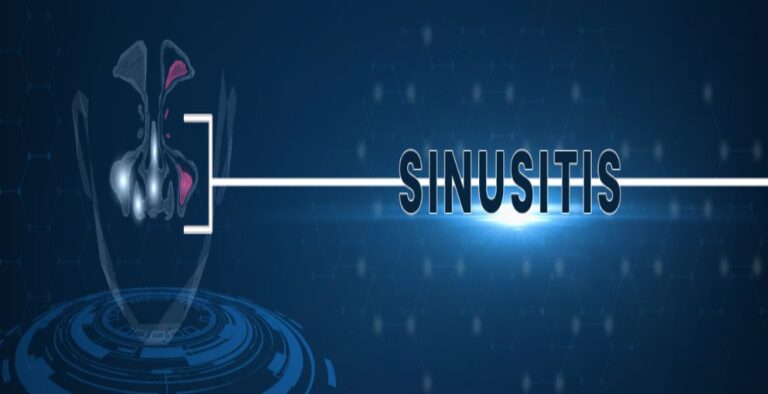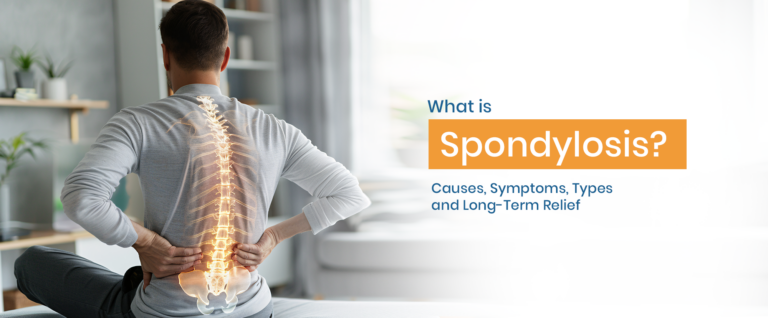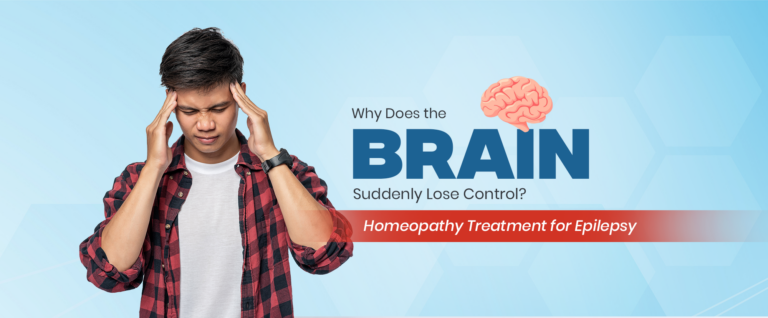The sinuses are hollow, air-filled cavities within the skull. They are situated behind the forehead, nasal bones, cheeks, and eyes. Sinusitis is the inflammation of the tissues lining the sinuses. This condition leads to facial pain, congestion, a runny nose, and sometimes a fever, with other symptoms. While it’s commonly triggered by a cold, sinusitis can also be caused by viruses, bacteria, fungi, and allergies.
In this article, we will explore Sinusitis in detail and also learn how you can treat it with homeopathy. So please keep reading.
What is Sinusitis?
Sinusitis is a condition that leads to inflammation and swelling of the sinus tissues. Bacterial infections, allergies, or even viral infections can irritate the sinuses, leading to blockage and fluid build-up. Due to the blockage and fluid buildup in the sinuses, the individual affected may experience pain and a feeling of pressure in their face along with nasal congestion. Sinusitis and sinus infection are two separate conditions that are often used interchangeably.
What is the prevalence of Sinusitis?
- In 2018, 28.9 million adults, or 11.6%, were diagnosed with Sinusitis.
- Around 2.7 million physician office visits were due to chronic Sinusitis as the primary diagnosis that year.
- Acute bacterial rhinosinusitis (ABRS) accounts for 20% of antibiotic prescriptions in adults, making it the fifth most common reason for such prescriptions.
- Approximately 6-7% of children with respiratory symptoms are diagnosed with acute rhinosinusitis, while 16% of adults receive an ABRS diagnosis each year, though overestimation is possible due to the clinical nature of the diagnosis.
- Between 0.5% and 2.0% of viral rhinosinusitis (VRS) cases in adults and 5-10% in children develop into bacterial infections. Additionally, there were 234,000 emergency department visits for chronic Sinusitis in 2018.
What are the types of Sinusitis?
There are 4 types of Sinusitis. These 4 types include the following,
Acute Sinusitis:
This is the most common type of Sinusitis. The symptoms of acute Sinusitis last for less than 4 weeks. Acute Sinusitis mostly occurs as a result of bacterial or viral infections. This particular type of Sinusitis is characterized by symptoms such as nasal congestion (a blocked nose), pain and swelling around the face, constant headache, a decrease in the sense of smell, and a running nose.
Chronic Sinusitis:
This type of Sinusitis usually happens when an individual becomes infected by fungal or bacterial infection. Chronic Sinusitis usually persists for 12 weeks or more. The symptoms of this type of Sinusitis include post-nasal drip, a running nose, nose blockage, pain in the face and tenderness around the face. In chronic Sinusitis, one may also have a reduced sense of smell and taste.
Subacute Sinusitis:
This type of Sinusitis lasts for 4 to 12 weeks. The affected individual may experience symptoms similar to other sinus infection types. This type of Sinusitis typically begins after a cold or an allergy.
Recurrent Sinusitis:
This form of Sinusitis occurs when symptoms of acute or chronic Sinusitis reappear four or more times a year, with each episode lasting around two weeks.
What are the causes of Sinusitis?
Sinusitis is typically triggered by viral, fungal, or bacterial infections. However, certain conditions can increase your risk of Sinusitis. These include the following,
Seasonal allergies: Allergies often trigger nasal inflammation and excess mucus production, which can cause infections.
Environmental factors: Exposure to irritants can inflame the sinuses and increase mucus production. These irritants include tobacco smoke, second-hand smoke, vaping aerosols, chemicals, fumes, and allergens.
Infections: Any infection that leads to sinus inflammation and increased mucus production can raise the risk of Sinusitis.
Medications: Certain drugs may contribute to congestion, such as birth control pills, medications for high blood pressure or depression, and immunosuppressants. Consult your doctor before stopping any medication, and inquire if they might be contributing to your sinus issues.
Medical conditions: Conditions like asthma, gastroesophageal reflux disease (GERD), cystic fibrosis, and immune or autoimmune disorders can increase the risk of Sinusitis.
Structural abnormalities: Any alteration to the nose or sinus structure that disrupts the normal flow of secretions can cause mucus buildup. Common structural issues include nasal polyps, a deviated septum, a cleft palate, or tumors.
Other causes: Foreign objects in the nose, facial trauma, or dental infections can also lead to sinus problems. Additionally, nasal polyps can increase the risk of sinusitis.
What are the symptoms of Sinusitis?
The common symptoms indicating Sinusitis include the following,
- A running nose with thick green or yellow mucus production
- Pressure around the teeth
- Stuffed nose or nasal congestion
- Postnasal drip (mucus dripping down the throat)
- Ear pain or a feeling of pressure in the ears
- Pressure around the eyes, nose, and forehead
- Fever
- Cough
- A bad taste in the mouth
- Fatigue
- Headache
- Pain behind eye
- Face tenderness
- Bad breath
- Loss of smell
- Sore throat
What are the risks/complications of Sinusitis?
In most cases, acute Sinusitis does not lead to complications, but when it does, potential issues may include the following,
Chronic Sinusitis: Acute Sinusitis can trigger an ongoing condition known as chronic Sinusitis, which lasts more than 12 weeks.
Other infections: Though uncommon, the infection can spread to the bones (osteomyelitis) or to the skin (cellulitis).
Vision problems: If the infection reaches the eye socket, it may result in reduced vision or even blindness.
Meningitis: This is an infection that affects the membranes and fluid surrounding the brain and spinal cord.
How is Sinusitis diagnosed?
Healthcare providers diagnose Sinusitis by assessing your symptoms and reviewing your medical history. During the examination, they check your nose, ears, and throat for signs of drainage, blockage, and swelling.
In some cases, they may use an endoscope, a small, lighted device, to get a clearer view inside the nose.
When evaluating you or your child for Sinusitis, the provider may also,
- Look inside the nose for polyps
- Transillumination is used to shine a light against the sinuses to detect inflammation
- Tap on the sinus areas to check for signs of infection
A primary care provider might refer you to a specialist, such as an otolaryngologist (ENT), for further evaluation.
Specific Tests for Diagnosing Sinusitis
To confirm a sinus infection, your healthcare provider might order the following tests:
Nasal endoscopy: To get a detailed view of your nasal passages.
Nasal swabs: A sample of fluid from your nose is collected using a soft-tipped swab, which is tested for viruses or other germs causing your symptoms.
Imaging tests: A computed tomography (CT) scan may be recommended to get a clearer picture of what’s happening in your sinuses.
Allergy testing: If you are affected by chronic Sinusitis, your provider might perform allergy tests to determine if allergies are contributing to your condition.
Biopsy: In rare cases, a tissue sample may be taken from the nose for further testing.]
Some other tests: Some other tests that may also be conducted include nasal culture, ciliary function test, blood tests for immune function or HIV, sweat chloride test and nasal cytology.
What are the treatments for Sinusitis?
There are various treatment options for Sinusitis, depending on the severity of your symptoms and how long they’ve persisted. You can manage a sinus infection at home using the following,
- Decongestants
- Over-the-counter (OTC) cold and allergy medications
- Nasal saline rinses
- Staying hydrated by drinking plenty of fluids
If your symptoms don’t improve within 10 days, a healthcare provider may prescribe,
- Antibiotics
- Oral or topical decongestants
- Prescription intranasal steroid sprays (Avoid using nonprescription sprays or drops for more than three to five days, as they can worsen congestion.)
For chronic Sinusitis, treatment focuses on addressing the underlying cause. These treatments may include the following,
- Intranasal steroid sprays
- Topical antihistamine sprays or oral antihistamine pills
- Leukotriene antagonists, such as montelukast
- Surgery to correct structural issues, remove polyps, or address fungal infections
What are Homeopathy Treatment For Sinusitis?
Homeopathic treatments can be highly beneficial for individuals suffering from Sinusitis, especially those prone to seasonal allergies. Homeopathy offers not just temporary relief but also aims to provide long-term solutions by addressing the root cause of Sinusitis. Unlike other conventional treatments that primarily focus on suppressing symptoms, homeopathic remedies work by gently stimulating the body’s own healing response.
The key principle behind homeopathy is the use of highly diluted substances that treat the body’s triggers, such as allergens, to desensitize the immune system gradually. This approach helps reduce the body’s overreaction to allergens, which often cause inflammation and sinus congestion. Over time, homeopathic treatments can strengthen the immune system, helping the body to manage better and even prevent future sinus flare-ups.
How to prevent Sinusitis?
The most effective way to prevent Sinusitis is to steer clear of colds and flu or to address any issues promptly.
If you have allergies, then it is important for you to manage them. Some preventive measures that can help you prevent Sinusitis include the following,
- Get an annual influenza vaccine
- Staying hydrated by drinking plenty of fluids to keep your body moist
- Washing your hands thoroughly and frequently to keep germs at bay
- Minimizing stress
- Managing your seasonal allergies
- Getting a humidifier to add moisture to your nasal passages and sinuses
- Avoiding exposure to smoke
- Avoiding exposure to environmental pollutants
Conclusion
Sinusitis is a common condition that can significantly impact daily life, causing discomfort and pain. Understanding its causes, symptoms, and treatment options is essential for effective management. While conventional treatments focus on alleviating symptoms, homeopathy offers a holistic approach aimed at addressing the root causes of Sinusitis, providing not only relief but also long-term solutions.
At DrCare, we emphasize individualized care tailored to each patient’s unique health needs. Our homeopathic doctors are dedicated to formulating personalized treatment plans that address both the immediate symptoms and the underlying issues contributing to Sinusitis. By choosing a comprehensive treatment strategy, we aim to restore balance to the body and enhance overall well-being. If you are looking to prevent Sinusitis, adopting healthy lifestyle practices, managing allergies, and utilizing home remedies can go a long way in maintaining sinus health. Remember, effective management of Sinusitis starts with understanding the condition, and at DrCare, we’re here to support you every step of the way.





